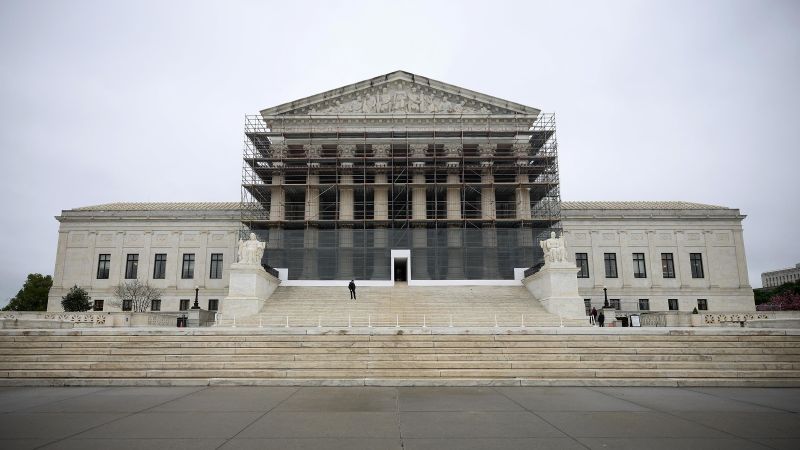CNN
—
The Supreme Court will hear oral arguments on May 15 in three cases challenging an executive order President Donald Trump signed on January 20 purporting to limit who is entitled to “birthright citizenship,” i.e., who automatically becomes a US citizen if they are born on US soil.
The argument is not formally about whether Trump’s policy is constitutional, but is, instead, focused on a technical question about the injunctions that three different lower courts issued to block the policy from taking effect.
The court’s ultimate decision will have a lot to say about whether and to what extent the policy is allowed to go into effect. While extraordinarily significant, that is not necessarily the same thing as a ruling on the policy’s legality; it is distinctly possible that the Supreme Court will go out of its way to not address whether Trump’s policy is constitutional in a ruling that nevertheless allows it go into effect across much (if not most) of the country.
Trump’s order directs federal agencies to not recognize as citizens individuals born in the United States on or after February 19 if, at the time of their birth, (1) their father was not a citizen or lawful permanent resident (“Green Card” holder); and (2) their mother was either unlawfully present in the United States or lawfully present with only temporary status (e.g., a student visa).
This executive order reflects a dramatic shift from what had been the consistent US practice going back to the ratification of the citizenship clause of the 14th Amendment in 1868, which provides that “All persons born or naturalized in the United States, and subject to the jurisdiction thereof, are citizens of the United States and of the State wherein they reside.”
Under that text, as interpreted by the Supreme Court in 1898, the immigration status of a child’s parents has historically been irrelevant to whether a child born on US soil is a citizen. Congress also passed a law in 1940 consistent with that understanding. Thus, the Trump policy would condition citizenship in many (future) cases on the mother’s immigration status at the time of the child’s birth. The policy itself would have no retroactive effect on those who are already citizens.
Multiple lawsuits were filed almost as soon as the executive order was signed seeking to block it. And within days, the order was blocked by a number of federal courts –including, as relevant here, federal district courts in Massachusetts, Maryland and the state of Washington. Each of those courts entered “preliminary” injunctions concluding that the executive order was unlawful, blocking it indefinitely while the government appealed.
As especially relevant here, each of the injunctions were “nationwide” injunctions – meaning they blocked the government not just from applying the policy to the plaintiffs in those cases, but from applying it to anyone, even those living outside of those three judicial districts. Thus, when the Trump administration asked the federal appeals courts to pause those injunctions, it also asked them, in the alternative, to at least narrow the injunctions so that they’d apply only to the plaintiffs. All three appeals courts (the Boston-based 1st Circuit; the Richmond-based 4th Circuit, and the San Francisco-based 9th Circuit) turned down both requests. That’s when the Trump administration took all three cases to the Supreme Court.
The Trump administration has framed its request to limit the injunctions as a “modest” one.
But if the court were to grant the request, it would allow officials to enforce the policy throughout most of the nation – against everyone other than the plaintiffs in these three cases.
The technical but critical point here is that the Trump administration is not formally asking the Supreme Court to get rid of the injunctions altogether (and uphold the policy). It’s asking only for the second type of relief it sought in the courts of appeals – to narrow the three injunctions so that they apply only to the plaintiffs.
This ties into concerns that administrations of both parties have raised about the power of courts to freeze a president’s polices nationwide. By raising that argument in the context of the highly controversial birthright citizenship policy, it is a transparent attempt to get the court to rule for the Trump administration without having to hold that these new limits on birthright citizenship are constitutional.
If the court sides with Trump, the practical effect would be largely the same; if the Supreme Court narrows these three district court injunctions to only the handful of specific, named plaintiffs in the three cases, then the result would be to allow the Trump policy to go into effect against everyone else – albeit without the Supreme Court specifically upholding it.
Of course, non-citizens who would be affected by the policy who are not parties to one of these three cases could bring their own lawsuits challenging it, and would likely succeed in those lawsuits, but their claims would have to be litigated on an individual basis—which would not only take some time, but might be beyond the resources of at least some of those who might be impacted.
These cases reached the Supreme Court in an unusual posture. They’re “emergency applications,” on the so-called shadow docket, not regular appeals.
The May 15 argument will be only the fourth time since 1971 that the court has held oral argument on this kind of emergency request. In two of the three prior cases (the January 2022 Covid-19 vaccination mandate disputes), the court ruled quite quickly – within one week of the argument. But in the third case, just last year (the “Good Neighbor” ozone pollution cases), the court issued its ruling as part of the regular end-of-term flurry in late June. We certainly expect a ruling no later than then, but it could come much faster.

